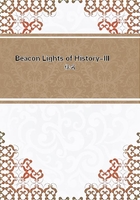
第118章
But how could this El Dorado be reached? Not by sailing round Africa; for to sail South, in popular estimation, was to encounter torrid suns with ever increasing heat, and suffocating vapors, and unknown dangers. The scientific world had lost the knowledge of what even the ancients knew. Nobody surmised that there was a Cape of Good Hope which could be doubled, and would open the way to the Indian Ocean and its islands of spices and gold. Nor could this Cipango be reached by crossing the Eastern Continent, for the journey was full of perils, dangers, and insurmountable obstacles.
Among those who meditated on this geographical mystery was a young sea captain of Genoa, who had studied in the University of Pavia, but spent his early life upon the waves,--intelligent, enterprising, visionary, yet practical, with boundless ambition, not to conquer kingdoms, but to discover new realms. Born probably in 1446, in the year 1470 he married the daughter of an Italian navigator living in Lisbon; and, inheriting with her some valuable Portuguese charts and maritime journals, he settled in Lisbon and took up chart-making as a means of livelihood. Being thus trained in both the art and the science of navigation, his active mind seized upon the most interesting theme of the day. His studies and experience convinced him that the Cipango of Marco Polo could be reached by sailing directly west. He knew that the earth was round, and he inferred from the plants and carved wood and even human bodies that had occasionally floated from the West, that there must be unknown islands on the western coasts of the Atlantic, and that this ocean, never yet crossed, was the common boundary of both Europe and Asia; in short, that the Cipango could be reached by sailing west. And he believed the thing to be practicable, for the magnetic needle had been discovered, or brought from the East by Polo, which always pointed to the North Star, so that mariners could sail in the darkest nights; and also another instrument had been made, essentially the modern quadrant, by which latitude could be measured. He supposed that after sailing west, about eight hundred leagues, by the aid of compass and quadrant, and such charts as he had collected and collated, he should find the land of gold and spices by which he would become rich and famous.
This was not an absurd speculation to a man of the intellect and knowledge of Columbus. To his mind there were but few physical difficulties if he only had the ships, and the men bold enough to embark with him, and the patronage which was necessary for so novel and daring an enterprise. The difficulties to be surmounted were not so much physical as moral. It was the surmounting of moral difficulties which gives to Columbus his true greatness as a man of genius and resources. These moral obstacles were so vast as to be all but insurmountable, since he had to contend with all the established ideas of his age,--the superstitions of sailors, the prejudices of learned men, and general geographical ignorance. He himself had neither money, nor ships, nor powerful friends. Nobody believed in him; all ridiculed him; some insulted him. Who would furnish money to a man who was supposed to be half crazy,--certainly visionary and wild; a rash adventurer who would not only absorb money but imperil life? Learned men would not listen to him, and powerful people derided him, and princes were too absorbed in wars and pleasure to give him a helping hand. Aid could come only from some great state or wealthy prince; but both states and princes were deaf and dumb to him. It was a most extraordinary inspiration of genius in the fifteenth century which created, not an opinion, but a conviction that Asia could be reached by sailing west; and how were common minds to comprehend such a novel idea?
If a century later, with all the blaze of reviving art and science and learning, the most learned people ridiculed the idea that the earth revolved around the sun, even when it was proved by all the certitudes of mathematical demonstration and unerring observations, how could the prejudiced and narrow-minded priests of the time of Columbus, who controlled the most important affairs of state, be made to comprehend that an unknown ocean, full of terrors, could be crossed by frail ships, and that even a successful voyage would open marts of inexhaustible wealth? All was clear enough to this scientific and enterprising mariner; and the inward assurance that he was right in his calculation gave to his character a blended boldness, arrogance, and dignity which was offensive to men of exalted station, and ill became a stranger and adventurer with a thread-bare coat, and everything which indicated poverty, neglect, and hardship, and without any visible means of living but by the making and selling of charts.
Hence we cannot wonder at the seventeen years of poverty, neglect, ridicule, disappointment, and deferred hopes, such as make the heart sick, which elapsed after Columbus was persuaded of the truth of his theory, before he could find anybody enlightened enough to believe in him, or powerful enough to assist him.